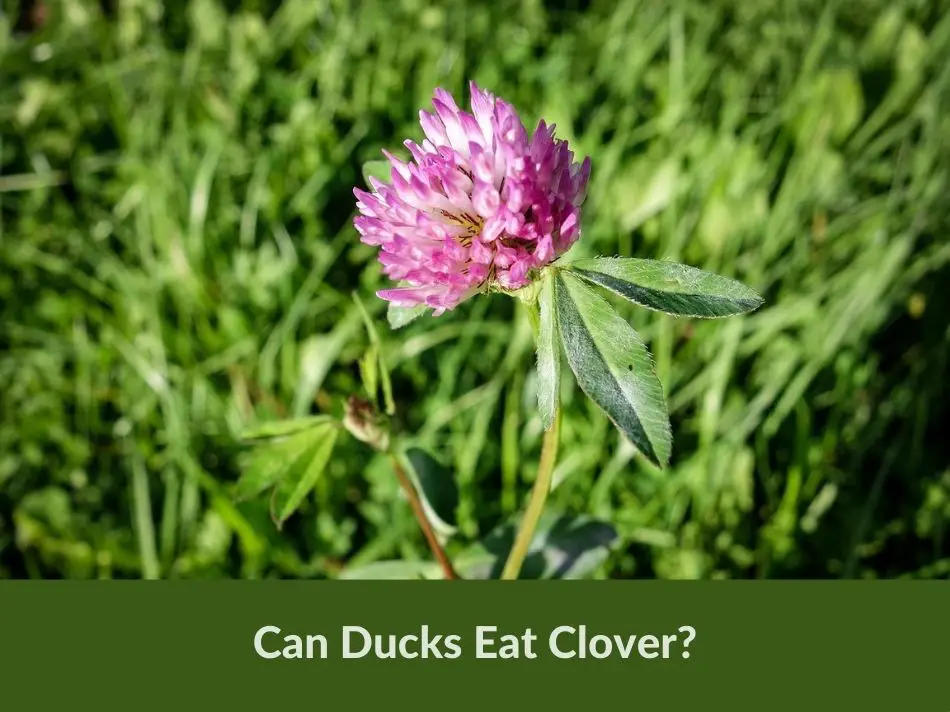Ducks are omnivorous animals. This means they can eat both plants and animals. In the wild, ducks typically feed on a variety of grains, small fish, insects, and plants, including aquatic vegetation. In domestic settings, they are often given pelleted food specially formulated for waterfowl, in addition to grains like corn and oats. But, can ducks eat clover?
Yes, ducks can eat clover. Red, white or crimson clover are all actually nutritious and can be a great natural treat for your ducks in addition to their regular diet.
In this article we will take a deep dive into ducks eating clovers. We’ll cover things like health benefits, advantages and risks.
What is Clover?
Clover is more than just a simple, low-growing plant often spotted in fields, lawns, and gardens. It’s a versatile member of the Fabaceae family, which also includes legumes like peas and beans. Widely recognized for its characteristic trifoliate (three-part) leaves, and sometimes even found with a lucky four-leaf structure, clover serves various roles in ecology, agriculture, and folklore.
Types of Clover
There are more than 300 species of clover, but some of the most common types include:
- White Clover (Trifolium repens): Often found in lawns and fields, white clover is a creeping perennial with white flower heads. It is widely used as a forage crop for livestock and is commonly seen in residential lawns.
- Red Clover (Trifolium pratense): Usually taller than white clover, red clover has deep red or pink flower heads and is also commonly used as forage for animals. It is a biennial or short-lived perennial.
- Crimson Clover (Trifolium incarnatum): Known for its bright red flowers, crimson clover is commonly used as a cover crop to improve soil quality.
Oxalic Acid Content
Some leafy greens, including clover, contain oxalic acid, which in excessive amounts can inhibit calcium absorption in ducks. While this is usually not an issue in moderate amounts, large quantities of clover should be avoided.
Freshness
Always ensure that the clover you are feeding is fresh and free from mold and other contaminants. Spoiled plant matter can lead to digestive issues in ducks.
Are Clover Healthy for Ducks?
Clover is rich in vitamins such as Vitamin A and Vitamin K. It is also a good source of calcium, phosphorus, and magnesium. These nutrients are essential for bone development, blood clotting, and overall well-being of ducks. Clover is also a source of protein, though not as high as animal-based protein sources.
Advantages of Feeding Clover to Ducks
- Nutrient-Rich: Clover is a good source of essential nutrients and can be a nutritious addition to your ducks’ diet.
- Natural Foraging: Ducks love foraging, and clover can be a wonderful plant for them to nibble on if they are free-ranging.
- Low Cost: If clover is naturally abundant in your area, it can be a cost-effective supplement to commercial feed.
Precautions
- Avoid Overfeeding: As with any feed, moderation is key.
- Check for Pesticides: Always ensure that the clover hasn’t been treated with harmful chemicals.
- Consult a Veterinarian: Before making significant changes to your ducks’ diet, it’s advisable to consult a veterinarian for personalized advice.
More Flowers Ducks Can Eat
In addition to clover, ducks can enjoy a variety of other flowers as well. Flowers not only add visual appeal to your ducks’ environment but also provide them with some added nutrients and enrichment for natural foraging behavior.
Don’t forget to take a look at our detailed list of flowers and plants that are safe for ducks.
Conclusion
Ducks can safely consume clover as part of a balanced diet. Its rich nutrient profile makes it an excellent supplement to their regular food. However, it should be offered in moderation and always sourced from safe, chemical-free areas. With these precautions in mind, clover can certainly find a place in your ducks’ varied and nutritious diet.
Disclaimer: The information in this article is for informational purposes only. I'm not an expert or a veterinarian.


